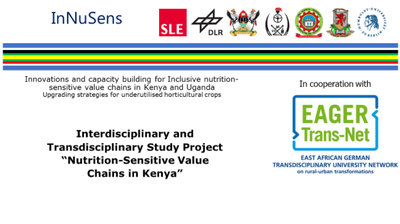Study Project InNuSens, 2022

Providing sufficient, healthy and sustainably produced food is a significant priority for sub-Saharan Africa (SSA) including Kenya and Uganda. Nutrition indicators are still alarming; volatility of markets, seasonality, as well as droughts and erratic rainfall resulting from climate change, are obstacles to a reliable and sustainable and nutrition-sensitive food supply throughout the year. Insufficient post-harvest systems in terms of low levels of processing and preservation for prolonging shelf-life, lack of food safety standards and quality management as well as unreliable and thin transport systems with limited support by information and communication technologies also hamper nutrition-sensitive value chains.
Within the frame of the BMBF and DAAD funded InNuSens project and the EAGER Trans-Net, an international group of 17 participants (12 students, 3 lecturers and 2 network coordinators) from five universities jointly planned and implemented an interdisciplinary student research project. The study project conducted an interdisciplinary situation analysis for two cases („value chain stakeholder networks“) in Vihiga and Kakamega Counties, Kenya. Main objective was to understand problems and particularly post-harvest losses along the value chains, as well as identifying innovative solutions. Focal areas of investigation were a stakeholder analysis, determinants of losses along the value chains including production systems, transport and marketing as well as cross-cutting aspects such as gender issues and social cohesion.
